Melinda W. Brown has worked with multiple nonprofit organizations focused on women’s issues and for a time, was also seeking guidance on how to resolve a family conflict. Her personal and public lives combined into a single memorable spiritual experience that led to three years of study and writing that became the book Eve and Adam: Discovering the Beautiful Balance.
Tell me about yourself.
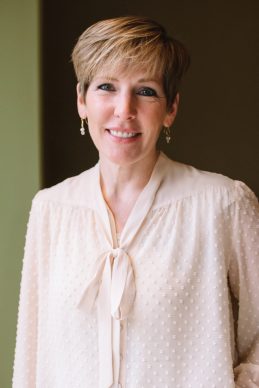
Melinda W. Brown
I grew up in two places: Belmont, Massachusetts, and Palo Alto, California. It was almost split time – about nine years in each, but it was back and forth. My dad was a professor of business at Stanford and Harvard Universities. He was playing the tenure game, so he went back and forth several times between the two to make sure that he was taking good care of his family. My younger siblings claim Boston as their hometown, but my older sister and I tend to claim California because we were teenagers there.
I love both places. Both places molded me into who I am, because of the amazing expansive-mind type of people we interacted with at those meccas of education and learning. The list of mentors is long in the twenty-year window from 1970 to 1990. All the great brains and hearts and minds that passed through those places – I went to Sunday School with them or had them as seminary teachers. They really did make me who I am.
The other piece that really shaped me was my father’s profession as a professor and as a business mind. In addition to teaching, he did loads of consulting with businesses and companies. He completely embodied a building and teaching mindset – that is who he is. His profession shaped our dinner conversations for my entire life. We always talked about things related to his students or the university or the latest factory he had visited, things he was figuring out and writing about. That’s in my blood – nature and nurture. It was both.
That sounds like amazing groundwork for your own college education.
When I got to BYU, I started in a math space, then moved to history, and ultimately landed on economics because I’d found my people. This is how my brain works, this is how I think, this is the thing that feels right at home. I was married halfway through my undergraduate time and had our first child in September of my senior year. I was determined to walk through that graduation line with her on my hip, at nine months old, which I did. Economics made that possible because it was something that came naturally to me. I loved it enough to do the hard work of plowing through school with a baby, who was not a good sleeper.
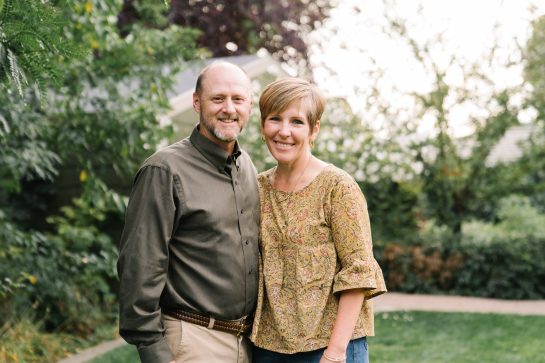
Melinda with her husband
From there, I was committed to supporting my husband through his medical training. We jointly made some important hard decisions about where that would take place so I could be home with our children. First and foremost, I really yearned for motherhood and for those experiences and blessings in my life. I was grateful to have four children. We have a daughter and a son, then a gap, and two more daughters about six years later. They are the joy of my life. While I didn’t necessarily practice in the field of economics during that time, I used my education every single day in my home, teaching my children. I also had opportunities for side gigs that were really fun for me. Life at home is a lot of work but a fair bit of mundane, so those side gigs helped keep things interesting.
Now that my children are grown, I’ve been digging into so many different things. I would really like to go back to college and get another degree. I’m getting a little older – I’m 51 – I can’t do dozens of degrees, so I’d better figure out which one I really want to do. There’s so much value in a multi-disciplinary approach. I was just reading the excellent book, Range: Why Generalists Triumph in a Specialized World, by David Epstein. He did a great forum for BYU in January 2021 – he has so many great insights about how crucial it is that we experience broadly to be able to think creatively about current problems.
That is a great perspective for our day. Some of the complex problems we are wrestling with are going to require the greatest creativity this planet has ever had. I’ve been really inspired by the idea that the more broadly we learn and expose ourselves to different solutions that have worked throughout history, in different places and cultures, little bits of that learning will come to our minds as we search for solutions to really thorny problems, of which we have many.
Which thorny problems have you decided to work on?
I’ve had several experiences with great organizations such as Fight the New Drug, Big Ocean Women, Days for Girls, and Better Days 2020. The common thread is women’s issues.
I got so deep into women’s issues that I started to really struggle with just how thorny those problems are. How are we STILL, in many places around the world, some not very far from my home, having issues that are plaguing women? We look back millennia and read the history, and of course, we expect to see hard things then. That seems to make sense. But still? Today? In the twenty-first century? This is really disheartening. I don’t mean to paint with too broad a brush but so much abuse and so many struggles come from the hands of men, and some cultural traditions are so hurtful and harmful, and the repercussions are not just for women but also for children.
It was in that space that I felt like surely, we could do more. We have to do more. There’s just so much, and everybody should be doing something. My parents have created a family foundation and to prepare for it, I attended an intensive course on nonprofit management at Duke University with my daughter-in-law, Allie. That has been a great education. Most recently, I’ve worked with the Elizabeth Smart Foundation and I’m currently on her board. For several years, I’ve worked with Fight the New Drug because I feel that they do great work in effective ways on one of the thorniest issues that I believe is at the core of a lot of these problems, which is pornography and the objectification of women.
That then led me into some very deep research trying to figure out our faith’s doctrine about Eve, about women in general, about the relationship between men and women, about our Heavenly Parents. All of this study came from that nonprofit work.
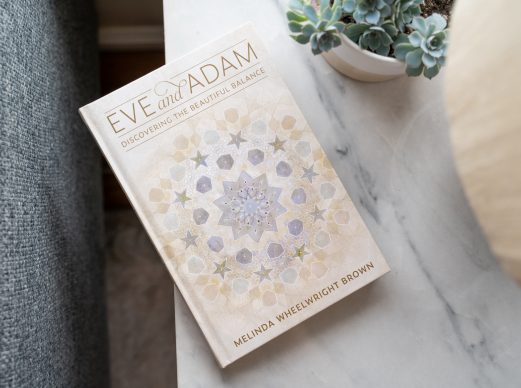
Eve and Adam
When I began the study that became the book, Eve and Adam: Discovering the Beautiful Balance, I really thought it would be in a nondenominational sort of vein, that it would just inform my humanitarian and philanthropic work, to figure out which organizations I wanted to work with, that sort of thing. I did not start with the intention to publish a church book.
Surprisingly, I discovered that the phrase from the Book of Mormon about “trying the virtue of the word of God” has really rung true (Alma 31:5). I know this is different for everyone, and thank heavens we’re all filling different roles because it’s much more effective that way. But personally, my space has shifted a bit to helping members of our church understand our faith and doctrinal beliefs well enough to apply them better, model them better, teach them better to the younger generations. I hope that’s one way I can leverage my passion for this topic to make a difference and facilitate change.
Why Eve and not one of the other scriptural women?
About five years ago, I had so much angst about women’s issues around the world and the things they struggle with. I felt so inadequate to make a difference, though I also felt this huge burden that I should make a difference because of how richly blessed I’ve been. I really needed to do something. I was having that whole existential crisis.
Concurrently, a family matter came up that was equally heart-wrenching, but for very different reasons. There’s so much love and complexity in a large family – we were trying to preserve and strengthen relationships, but there were some conflicting issues at play. We were having a bit of a struggle to navigate a rough patch through these relationships.
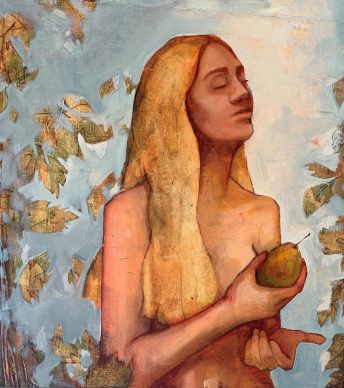
Mother of All Living by Caitlin Connolly
It was a day when the family matter weighed heavily on my heart. I was in my office looking at a painting that my husband had just given me for Christmas – “Mother of All Living” by Caitlin Connolly. Doug had chosen it for me because it was scriptural and feminine and temple-related. I’d just gotten off the phone from a hard conversation. In some desperation and with tears, I looked at this painting, which I loved and really appreciated, and I said out loud, “Eve, can you help me?” I had a very, very profound spiritual experience as if she leaned out of that frame and said, “Yes, I thought you’d never ask.”
It was unique enough – I don’t usually hear voices like that, that’s not how the Spirit has typically spoken to me – that wow, it knocked some sense into me. I was instantly done crying. What does that mean? How could Eve help me with this? This is not a Biblical sort of situation we’re in. What could her little story from a couple of chapters and a few scattered verses do for this real-life, real-hard experience we’re in the middle of?
Quickly, I got on the computer and figured out the right things to start reading, and eventually dove into everything I could find to read about her. For the immediate family crisis, within twenty-four hours, I felt like I had the answer presented to me by Eve. It had everything to do with: life is all about hard choices and about opposition.
I’ve come to recognize that this notion of “opposition in all things” is so much more than just “hard stuff.” It’s about tension and pressure and balance and harmony. It is a grand scope of what has to happen for us to learn well and effectively through the mortal experience.
For the family crisis, I took my thoughts to my parents the next day and said, “Maybe you won’t see the connections that I’ve found in Eve and Adam’s story, but I think this holds our answer of a way through this – by putting love first, by understanding that there are just some things that aren’t going to feel perfect all the time, we can all handle them a little bit differently, and we can put our relationships at the forefront. We can put our arms around each other for the greater good of the big family.” Right away, things started to shift.
As I shared those feelings about Eve and Adam, it really resonated with the women – my mother, my sisters, my sisters-in-law. Sometimes it took additional discussions with the men to help them recognize how we could do this effectively. Everybody got on board quickly and it turned into the sweetest time for our family. This experience has borne so much beautiful fruit because we were interested in following Eve’s example of embracing the hard thing for the sake of love and family and with a very long-term perspective. We’re playing the long game.
And then this study evolved into an actual book. What was the transition?
When I started the book research, it didn’t start out as “book” research. It was just research that later started to feel like the makings of a book. For the first year, it was just to satisfy my own searching and wrestling and struggling to figure out how all the pieces fit together and how this could make sense.
When I began the writing process, I leaned pretty heavily on some close friends and relatives who I really trusted with doctrinal issues as well as creative pursuits, as beta readers and pre-editors. The two at the forefront were Candace, my third daughter, and Allie, my daughter-in-law (married to my son). My parents were phenomenally helpful in that role as well, as was my husband.
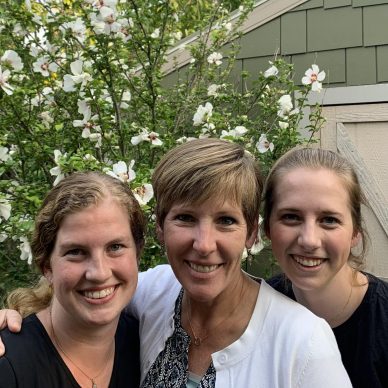
Brave.Like.Eve Instagram Team
I decided to finish the manuscript before I pursued any sort of publishing. At that point, Allie and Candace were the most critical. They were the bravest at telling me what I needed to hear but maybe didn’t want to. Candace had a particular knack for saying, “Mom, at some point you’re going to have to stop doing research and start writing. I think you’ve crossed a line that you’re now being selfish not putting this out there, what you’ve found. A year from now, you would have written a different book, and that’s okay. The next person can write that book. Get this one out so it’s a stepping stone to more information.” She was crucial in my pulling the trigger because maybe I’d still be researching and wouldn’t have even picked up the pen at this point if she hadn’t pushed me.
Allie was such a great voice to the people in the space of young adults – she is a mother of two small children, recently finished graduate work, and is incredibly intelligent and aware of what is happening in the world among her peers. That’s the group that I was most focused on writing to. So she was a great sounding board to make sure that I was finding the right language to speak to that audience.
Language matters. That was so huge to me through the whole process. In the language of the scriptures, there’s so much that we assume. We cross cultural bridges without even realizing they exist as we study and read scripture, and then add the modern experience of ongoing scripture. I’m getting a new idea of what the Tower of Babel may have really been about because I feel that we’re in a time with so many different communication styles and languages between even the people we think we’re closest to. We are just not speaking the same language. We’ve got to find a way to have our thoughts and feelings and emotions not confounded based on our lack of vocabulary similarities.
I believe strongly in “Meet me in the middle.” This is my motto that I remind myself of every day. I want to stop with the extremes, come in where we can put our arms around each other, put our heads together, listen, feel each other’s feelings, and then find solutions based on our common ground. We have so much more common ground than we think we do. But if we’re not speaking the same language, that pushes us to the extremes, and it’s a terrible place to be. I think we all feel that right now. It’s a very uncomfortable, awful place to be, and language matters. We’ve got to develop better communication skills so we can listen better and learn better from each other.
Emotion has clouded everything so much recently that people are literally incoherent and just making sounds, not saying words. The phrase “confounded language” explains so much today! Good call!
That’s what it feels like to me. So to go back, I was able to take the manuscript to Deseret Book and they were excited about it. But it was a long process of publishing – sixteen months from the date of the first visit until the day the book was released, right at the beginning of lockdown in COVID, which was not great timing.
It was important to them that I create a social media presence – that was very foreign to me and wasn’t something I was looking forward to. I found professional help to get it off the ground but quickly realized it was something I didn’t feel capable or interested in doing by myself. I thought I would do a better job if I had different voices and insights with me and realized that Candace and Allie were the perfect people to do that with. Our Instagram is @brave.like.eve.
It has been the sweetest experience to do that together. We work on it jointly even though we live in different places. We’ve got some great systems in place through all the various technologies at our disposal. It provides a beautiful opportunity to talk and think and ponder together about spiritual things that often doesn’t happen in the rush of the world between three women in different stages of life, all very busy. But it’s just the right thing for us.
We try to really focus on the idea of faithful courage – it’s all about doing the brave thing. We post three times a week with one insight about that week’s Come Follow Me materials, another about what we’ve found in our readings or experiences that might resonate with our community, and a Sunday post always focused on the Savior. We use a lot of outstanding art and try to feature LDS artists especially, but also artists from everywhere and lots of different traditions and time periods. We make sure that we’ve chosen our words carefully, and we try to be very inclusive and thoughtful and sensitive to how other people might feel as they read it. As it turns out, it’s blessing lots of additional people’s lives – women and men – we’re enormously grateful because it’s blessed us immensely.
I was going to ask what you’ve done in your personal life to incorporate what you’ve learned about Eve through the book research, but I see now that’s a backward question, because your life is what triggered the book research in the first place. So you’re working on women’s issues with your family’s foundation, the book, the Instagram account. What’s next?
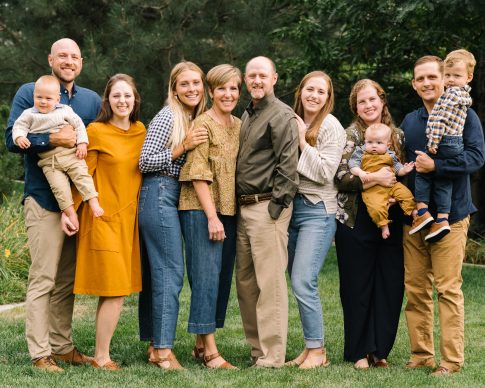
Melinda’s Family
I’ve spent the past year and a half since the book came out doing speaking events, writing articles for different outlets, little things that I’ve just felt like I’ve needed to do to ride that wave. My friends at Deseret Book have asked what project might come next. I’ve been thinking about that and want to be sure I don’t jump into something that I’m not so totally passionate about that I could spend five years on it. That’s what a good book takes, in my opinion. It’s a lot of work.
Right now, one of the great joys of my life is that my husband and I serve in one of the BYU campus wards with pre-mission freshmen, and I’m teaching Temple Prep to fifty to sixty kids a semester. It is sheer delight for me. It feels like such a crowning blessing to the last decade of all these things we’ve just talked about.
There’s no topic I’d rather think about and expound on and share ideas about, and especially with the rising generation. I put a lot of thought every day and every week into that. At least for now, I feel like that’s my current mission. I would love to be a full-time missionary in that vein – teaching young adults and sharing thoughts and ideas with them, really working to un-confound our languages, reframing things in a way that is more effective in helping them understand the bigger picture of what mortality and the gospel of Jesus Christ are about. It would be such a shame to lose the thread because we’re speaking different languages.
The vast majority of the temple experience is hidden in plain sight throughout the scriptures and throughout history. There are lots of ways to prepare people well for that experience, talking more openly than we have in the past. Elder Bednar said in General Conference that we should talk about everything we can talk about, so people are prepared for it. A lot of what I share with the students is from my own experiences and my own study and research.
And it all goes back to when Eve “talked” to you from a painting.
Five years later, I can see just how hugely life-changing that experience was. Since that time, I’ve had other family crises and hard things. Always, I take it back to that basic message that we learn from Eve’s example in the scriptures: do the brave thing with faithful courage. In her case, that was facilitated by her relationship with our Savior, who I believe was in the Garden of Eden with her. In a powerful way, not physically but spiritually, I believe He left the Garden with her and Adam. Eve can serve as a proxy for us, as a representative of us, and mentor to us. We all made very similar choices in our premortal existence to embrace mortality and do the hard thing with a very long-game perspective in mind, and with the understanding that we could trust our Savior, that He could and would do what He said He would do for us to make it feasible, that it could work out and all be for our good and benefit.
Here we are in the middle of it. It’s working, and we just keep following Eve’s courage.
————————-
Melinda W. Brown will be presenting an online fireside with the LDS Women Project on Tuesday, November 9 at 6:30 pm MTN/8:30 pm EST. She will be discussing her book, Eve and Adam: Discovering the Beautiful Balance and taking questions, and there will be a drawing give-away to receive a copy of the book. Register here to receive the Zoom link.
At A Glance
Name: Melinda W. Brown
Age: 51
Location: Provo, Utah
Marital History: Married, 31 years
Children: 4
Occupation: Writer, Researcher, Public Speaker
Convert to the Church: Born in the church
Schools Attended: B.S. in Economics from BYU, 1992
Languages Spoken At Home: English
Favorite Hymn: Come Thou Fount of Every Blessing
Website or Social Media You Would Like Featured:: https://www.instagram.com/brave.like.eve/?hl=en
Interview Produced By: Trina Caudle
